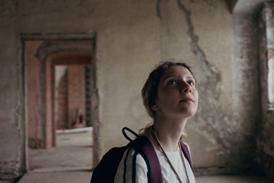
Juries impact again this year
Once again, the nominating juries – introduced by Bafta for the 2021 film awards – have been seen to have an impact.
In best film, which are the pure votes of Bafta members, the nominees are Belfast, Don’t Look Up, Dune, Licorice Pizza and The Power Of The Dog. Only the last two of those five titles appear on the six-strong director list, which are the choices of a jury. Kenneth Branagh, Adam McKay and Denis Villeneuve did not prevail with jury members.
This year’s director jury picked three men (Paul Thomas Anderson, Aleem Khan for After Love and Ryusuke Hamaguchi for Drive My Car) and three women (Jane Campion, Audrey Diwan for Happening and Julia Ducournau for Titane). Three of those choices are for foreign-language films – as was the case a year ago with Another Round, Minari and Quo Vadis, Aida? in the director category. And the three female nominees compare with zero women nominated for director in the years 2014-2020 – before the jury was created.
In the acting categories, this year the power of the juries was curtailed – after last year when supposed frontrunners such as Carey Mulligan (for Promising Young Woman) and Olivia Colman (The Father) were shunned by juries. This time around, the top two round-one choices of voters in each performance category were automatically nominated – with juries adding four names in each case, selected from the longlists.
The automatic inclusions this year didn’t help Colman (The Lost Daughter) who failed to make best actress, and ditto Kristen Stewart (Spencer), a presumed front-runner. Instead, the combined process has produced a list of 24 nominees across the acting categories including 19 names achieving nominations for the first time – from seasoned A-listers Will Smith (for King Richard) to 11-year-old Woody Norman (C’mon, C’mon).
Probably the result of jury decision: the inclusion of a performance in a foreign-language film, with Norway’s Renate Reinsve nominated for Joachim Trier’s The Worst Person In The World. Another likely jury choice: Ann Dowd receiving her first Bafta nomination at the age of 66, for Mass.
This year, a jury was added to create the nominees in the documentary category after concerns last year that the voting chapter had produced relatively mainstream names. The resulting five nominees include titles expected to also make the running at Oscar – such as Summer Of Soul, Flee and The Rescue – alongside Andrea Arnold’s Cow, and Liz Garbus’ Becoming Cousteau.
UK films clock up multiple nominations
It is a constant gripe levelled at the Bafta Film Awards by UK producers – the international scope of the awards means that UK films often get swept away by major US titles that will in any case get their reward at the Oscars. This year, Bafta can point to the fact that half of the 12 most-nominated titles – each with four nods or more – are deemed to be ‘British’ according to its own qualifying criteria.
Chief among them are Belfast with six nominations and No Time To Die with five. Indie dramas After Love and Boiling Point have four apiece, as do Rebecca Hall’s US-set directing debut Passing (with Film4 among its backers) and Joe Wright’s Cyrano (from Working Title Films).
The flipside of this achievement can be observed in the best film category, where only one of the five nominees (Belfast) qualifies for Bafta as a British film – compared to last year, when Bafta-qualifying British titles The Father, Promising Young Woman and The Mauritanian all achieved best film nominations. (This year, best film nominee The Power Of The Dog has strong UK producer elements thanks to Tanya Seghatchian and Iain Canning but has not qualified as a British film.)
This year’s outstanding British film category is notable for including a fair few major box-office hits – unlike a year ago, when The Father (£2.1m at UK and Ireland cinemas) proved to be the highest theatrical grosser among the 10 nominees. Nominated today are No Time To Die (£96.7m in UK and Ireland), House Of Gucci (£9.8m to January 30) and Belfast (£6.1m to January 30), as well as Last Night In Soho (£2.4m) and box-office hopeful Cyrano (released in the UK and Ireland on February 25).
All those five films are backed by a US studio and are presumed to be the top choices of the Bafta voters, and thus automatically nominated. The special jury is likely to have added After Love, Ali & Ava, Boiling Point, Passing and – a relative surprise – Everybody’s Talking About Jamie.
Once again the outstanding British film jury has given short shrift to some of the voters’ more conventional round-one choices. The 20-strong longlist for the category included a number of titles with period and/or biographical subject matter, with several based on literary material: Operation Mincemeat, Munich: The Edge Of War, The Colour Room, The Electrical Life Of Louis Wain, Benediction, The Duke and Mothering Sunday. All have fallen out at the nominations stage, as has Princess Diana drama Spencer and Matthew Vaughn’s First World War-themed The King’s Man.
Rule changes bring greater diversity, but work to be done
For the second year running, at least three of the six best director nominees are women: it seems that changes to the voting structure for this award have produced more representative results. While the number was one down on last year’s four – and only one of the best film nominees was directed by a woman – the overall number of female directors is up to 12, with the number of female nominees in total up to a record high of 70.
France’s Audrey Diwan (Happening) and Julia Ducournau (Titane) are both on the director list. One damning statistic: Ari Wegner is the first woman nominated for best cinematography, for Jane Campion’s The Power Of The Dog; the task of Bafta and the indusry is now to ensure she is the first of many.
There is also a split in the screenplay sections: five from five men in the original category; with three from five women in the adapted one, including first-time feature writer/director Maggie Gyllenhaal for The Lost Daughter.
However, just seven of the 24 nominated actors are non-white, down from 16 last year. This figure is still up significantly on 2020, when no non-white actors were nominated; and 2019, when three were. Improvement is needed in other major categories; while two of the six best director nominees are non-white, none of the five directors of the best film nominees are, with only Aleem Khan among the 10 outstanding British film selection. Among original screenplay, adapted screenplay, original score and cinematography, only one non-white person has been selected: Ryusuke Hamaguchi, for Drive My Car’s adapted screenplay.
Studios make a comeback
Traditional Hollywood studios made something of a comeback in 2022 at this nominations stage after Netflix and Altitude – one of the most active theatrical distributors during the period when cinema’s first reopened – dominated the Bafta nominations last year. Universal (encompassing Focus and distributing MGM titles outside the US) leads the way with 25 nods, compared to seven in 2021, pipping Netflix’s 22 (down on 2021’s 35).
Also improving on their 2021 tallies are Disney (encompassing Searchlight) on 19 nominations (up from 13), and Warner Bros on 16 (compared to seven), as a wide selection of prestige studio fare – Dune, Belfast, Licorice Pizza, No Time To Die and West Side Story – earned multiple nods.
The independent highpoints are Vertigo’s Boiling Point and BFI Distribution’s After Love, which both earned four nominations including, respectively, best actor for Stephen Graham and best actress for Joanna Scanlan. Four independent distributors in total – Vertigo, BFI, Mubi and Modern Films – earned four nominations.
First-time nominees
Bringing fresh voices into a sometimes staid awards scene has been a key Bafta goal in recent years. This year, 19 of the 24 acting nominees are recognised at the film awards for the first time, ranging from Woody Norman – this year’s youngest nominee, to Will Smith, included for King Richard and nominated for a Bafta for the first time.
There is a range of backgrounds as well: stage stars Ariana DeBose and Mike Faist making the transition to screen in West Side Story; hearing (Emilia Jones) and non-hearing (Troy Kotsur) actors from Coda; native Norwegian speaker (and Cannes best-actress winner) Renate Reinsve for The Worst Person In The World; and a selection of first-time UK acting nominees, including Graham, Scanlan and Ali & Ava’s Adeel Akhtar.
Four of the six best director nominees are up for the first time. Perhaps surprisingly, the other two – Paul Thomas Anderson and Jane Campion – have only been nominated once each before. This marks a change from many prior years; in 2015, nominated directors Alejandro Gonzalez Inarritu, Ridley Scott and Steven Spielberg had already been included nine times previously.
The technical categories show a mixed picture as regards new talent. In original score, cinematography and costume design, four out of five nominees have previously been nominated; but new faces appear in editing and production design.
Surprise inclusions and omissions
Everybody is finally talking about Jamie, after Jonathan Butterell’s musical about a teenager hellbent on living out his dream of being a drag queen received an unexpected nomination for outstanding British film. Everybody’s Talking About Jamie found its home in the UK on Amazon last September.
Pablo Larraín’s Spencer has been shut out entirely, receiving no nominations – another blow to the Oscar hopes of lead Kristen Stewart, who also failed to receive a SAG nomination for her portrayal of Princess Diana. The same person has won best actress at the Baftas and the Oscars every year since 2012, when Jennifer Lawrence clinched the Academy Award for Silver Linings Playbook, while Emmanuelle Riva took home the Bafta for Amour.
Colman is another notable omission from the best actress category for The Lost Daughter (an award she won back in 2019 for The Favourite), and there was still no Bafta love for Denzel Washington for The Tragedy Of Macbeth and nothing for Andrew Garfield for either Tick Tick… Boom! or The Eyes Of Tamy Faye.
Is this thing on?
UK followers will have been glad for the post-midday start for the nominations, which have gone out earlier in the day in previous years – sometimes as early as 07.00 GMT. However, the presentation was strangely unbalanced: a long address from Bafta chair Krishnendu Majumdar was followed by only 10 categories being announced live by hosts, TV presenters AJ Odudu and Tom Allen. Those excluded from the short show included film not in the English language; documentary; animated film; and original score, plus eight other craft awards.
Odudu and Allen gamely battled through technical difficulties with the sound on the live feed; Bafta will be glad of a return to its regular in-person event for the main ceremony.
























No comments yet